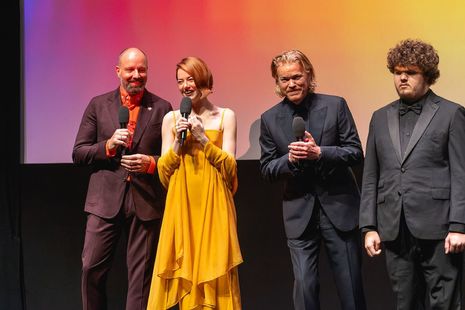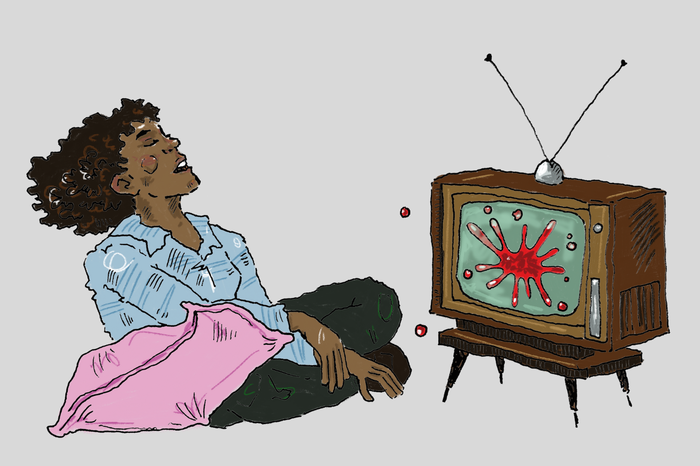Is Emma Stone an alien in Bugonia?
Dylan Ingram reviews the new black comedy from acclaimed director Yorgos Lanthimos

Bugonia, the new film by The Favourite and Poor Things director Yorgos Lanthimos, has a great premise and a great trailer. A distractingly greasy Jesse Plemmons kidnaps Emma Stone’s Michelle Fuller, the CEO of a big pharma company, not out of economic grievance, but because he is convinced she is an alien. Not just any alien, but the agent of a galactic conspiracy hailing from the Andromeda galaxy and intent on destroying humanity by hijacking our pleasure centres and undermining traditional masculinity.
Plemmons’ Teddy is a character who won’t seem too implausible to anyone who’s scrolled for long enough on instagram reels. He’s done his own research, you see, and he’s the only one who knows how to save humanity. Over the course of the film, this conviction is threatened, interrogated and agonisingly brought into the grimy light of a weirdo’s basement. Plemmons’ face dances with doubt and anxiety as Michelle probes his beliefs. He speaks in online conspiracy-theory clichés to obscure his deep, directionless anger. It’s impossible to pin his ramblings down to a coherent ideology, outside of the fact that Emma Stone is definitely an alien. Definitely.
“These performances complement and contrast with each other as dominance and defiance flow between the characters”
Michelle is confident, speaking in her own language of corporate jargon and therapy speak. She wants to facilitate a “dialogue” and find an equitable solution. At one point she says to Teddy “I understand now, you need help”. Where Teddy is often hiding his emotions or concealed in darkness, Michelle is exposed, both lit and shot from above, her eyes twitching through realisations and changes in strategy. Teddy has manipulated his cousin, Aiden Delbis’ Don, into aiding with the crime. He adds tension and uncertainty into the dynamic as Michelle and Teddy battle over his clearly conflicted soul. In the film’s best scenes, these performances complement and contrast with each other as dominance and defiance flow between the characters.
At other times though, the characters’ lack of common ground grinds the film to a halt. Multiple, consecutive scenes repeat the following structure: “You are an alien.” “No I’m not.” “Yes you are.” “Really, I’m not.” There is an important message here about the impossibility of a dialogue between those with opposing interests and unequal power, but the execution didn’t work on me. It felt like it was going in circles until the film picked up enough momentum to break out of its own repetition. A lot of the comedy comes from laughing at modern clichés. While the jokes landed with my audience, to me they felt a little tired and, more damningly, a little cringe. Their commentary on modern discourse felt out of step with Lanthimos’ usual absurd humour. The funniest thing about this movie is Teddy’s wacky conspiracy theories, and while the film expands his character beyond this stereotype, the jokes don’t evolve alongside him.
“While the film expands his character beyond this stereotype, the jokes don’t evolve alongside him”
There are still plenty of squirming, uncomfortable scenes which Lanthimos fans will love though, including one shot so over-the-top gory that I couldn’t stop laughing at it. The next scene made me scared to walk home from the cinema alone. This switching through genres and tones worked beautifully for the middle section of the movie, fixing my eyes to the screen in glee and terror. Yet by the end of the film, the constant swerving had lost a lot of its impact. I felt like it was just trying to surprise me with the next crazy idea and it threw me out of the experience.
The film looks amazing. It’s stylish and colourful. Most of it is shot in Teddy’s house and basement, which is always bathed in queasy yellow light. It feels like you have been kidnapped by the movie. I could feel the dust, cobwebs and grime coating the whole place. The score is loud and intense, elevating the madness of the second half, but not nearly as unsettling as the haunted piano in Lanthimos’ previous Kinds of Kindness, also featuring Stone and Plemmons. I think I preferred that film because its three-part structure demanded tighter storytelling and more economic writing, with a greater density of exciting ideas and situations.
Bugonia feels at times like it would have been better as a shorter movie. It can be repetitive and takes a long time to find its pace, but once it got going I was completely hooked. When it’s really working, the film is entertaining and shocking and well worth the visit to the cinema. If you liked Lanthimos’ previous movies, you’re probably already planning on seeing this, but it is also a great place to start if you haven’t seen any of his films. It wasn’t quite what I wanted, but I think lots of people will fall in love.
 News / Judge Business School advisor resigns over Epstein and Andrew links18 February 2026
News / Judge Business School advisor resigns over Epstein and Andrew links18 February 2026 News / Gov grants £36m to Cambridge supercomputer17 February 2026
News / Gov grants £36m to Cambridge supercomputer17 February 2026 News / CUCA members attend Reform rally in London20 February 2026
News / CUCA members attend Reform rally in London20 February 2026 News / Union speakers condemn ‘hateful’ Katie Hopkins speech14 February 2026
News / Union speakers condemn ‘hateful’ Katie Hopkins speech14 February 2026 News / Hundreds of Cambridge academics demand vote on fate of vet course20 February 2026
News / Hundreds of Cambridge academics demand vote on fate of vet course20 February 2026










